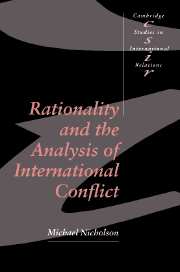Book contents
- Frontmatter
- Contents
- Preface
- Introduction: Rationality and the analysis of conflict
- PART I CONFLICT
- PART II RATIONAL BEHAVIOUR
- 3 RATIONALITY AND CONFLICT
- 4 CONFLICT AND THE PARADOXES OF RATIONALITY
- 5 THE ZERO-SUM GAME: SOLUTIONS AND INTERPRETATIONS
- 6 EMOTION AND RATIONALITY
- 7 INTERNATIONAL CRISES: THE WARPING OF RATIONALITY
- RATIONAL BEHAVIOUR AND RATIONAL CHOICE: AN ASSESSMENT
- PART III RATIONAL BELIEF: SOME TOPICS IN CONFLICT ANALYSIS
- PART IV CONCLUSION
- References
- Index
- Titles in the series
4 - CONFLICT AND THE PARADOXES OF RATIONALITY
Published online by Cambridge University Press: 24 November 2009
- Frontmatter
- Contents
- Preface
- Introduction: Rationality and the analysis of conflict
- PART I CONFLICT
- PART II RATIONAL BEHAVIOUR
- 3 RATIONALITY AND CONFLICT
- 4 CONFLICT AND THE PARADOXES OF RATIONALITY
- 5 THE ZERO-SUM GAME: SOLUTIONS AND INTERPRETATIONS
- 6 EMOTION AND RATIONALITY
- 7 INTERNATIONAL CRISES: THE WARPING OF RATIONALITY
- RATIONAL BEHAVIOUR AND RATIONAL CHOICE: AN ASSESSMENT
- PART III RATIONAL BELIEF: SOME TOPICS IN CONFLICT ANALYSIS
- PART IV CONCLUSION
- References
- Index
- Titles in the series
Summary
THE ‘PRISONERS' DILEMMA’ AND THE ‘SURE-THING PRINCIPLE’
The following rule appears trivially self-evident as a rule of rational conduct. It is known as the ‘sure-thing principle’.
Suppose that I am going for a walk and wondering whether or not to take my dog with me. I am unsure whether it will rain or not, which will clearly affect my enjoyment. If it does not rain and I have my dog I am happiest, because I can throw sticks for it on the beach. I am still happy, but not quite as happy, if it does not rain and I do not take my dog, for I can still sit and admire the sea. I am less happy if it rains. However, if I have my dog, I can still play with it, but I know I will have to clean it up when I get home, which detracts from my pleasure. I prefer this to the fourth possibility of walking along the beach in the rain alone and without my dog. My problem is whether to take the dog with me on my walk when I do not know whether it will rain or not. For clarity let us suppose that I am willing to put numbers to my degrees of contentment (though the core of the argument does not require this).
- Type
- Chapter
- Information
- Rationality and the Analysis of International Conflict , pp. 63 - 88Publisher: Cambridge University PressPrint publication year: 1992



